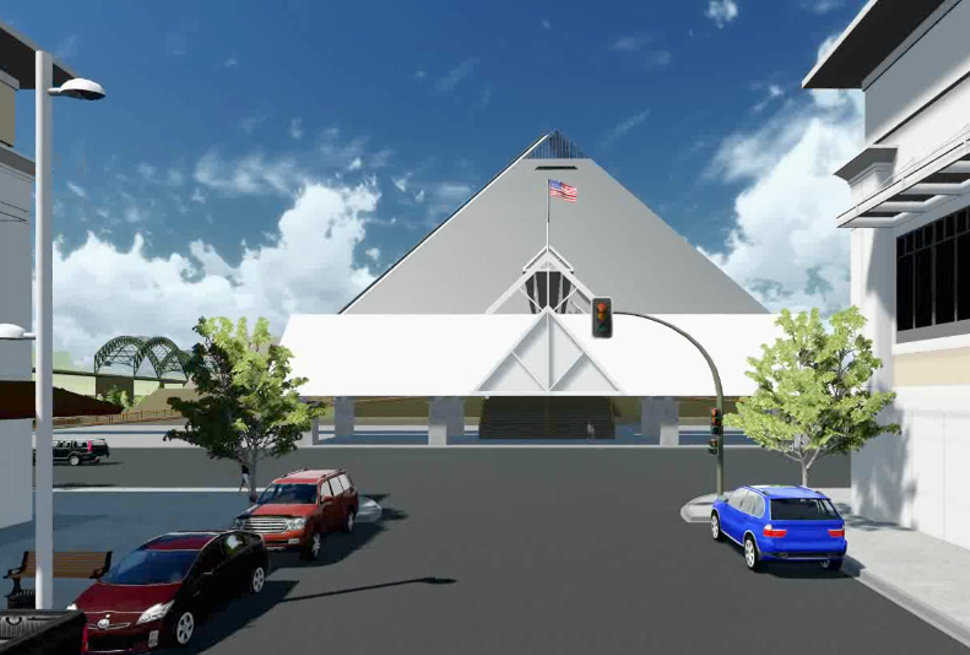Bass Pro Shops and its Memphis boosters want to close the deal for the Pyramid this week but there are several unanswered questions, conflicting statements, and surprising revelations in the fine print.
They have to do with the timing of the convention center improvements, the development of the Pinch District, the acquisition of property in the Pinch, a $10.4 million annual “surplus” in the downtown Tourism Development Zone fund, a 400-percent growth in that fund in less than ten years, and the amount of money Bass Pro is putting into the deal.
The Shelby County Commission meets Monday to sign off on a $74.9 million deal that would transfer all of the debt as well as some well-stocked tax revenue streams to the city of Memphis. This is part of the widely reported $191 million financing package, which gives the impression that it includes the cost of improvements to the convention center. But it does not. That is Phase 2 of the project, along with a proposed $80 million development of the Pinch District, and is not included in the financing.
A county commission committee voted 6-1 last week to go ahead with the deal. To some members eager to shed all things Memphis, the deal is “a no-brainer.” But members were given only an overview of the project and no time to study the financials in detail. The Memphis City Council approved it 12-0 on the basis of recommendations from Mayor A C Wharton, Housing and Community Development Director Robert Lipscomb, and a slide presentation showing how Bass Pro could transform downtown.
That presentation, along with a study by the city’s consulting firm RKG Associates, raise some important questions.
In the RKG report, finished in mid-July, Bass Pro’s contribution to Pyramid reconstruction is $81.5 million, including a 80-room hotel. The public contribution is $50 million, plus another $25 million for seismic protection. But there was nothing in the council presentation about a Bass Pro contribution other than the rent of $1 million a year or 2 percent of sales.
The RKG report says Bass Pro sales will be about $106 million a year. It says a Tourism Development Zone will capture the 9.25 percent sales tax (less 8 percent of that) for debt service. The estimated debt service from Bass Pro sales taxes is $9 million a year. A “TDZ surplus” of $10.4 million a year is also included as a source of debt service. It is not clear what the surplus comes from.
The TDZ was set up in 1998, specifically for the benefit of the convention center. The Pyramid is considered an ancillary facility even though Wharton and Lipscomb are acting like it is the other way around. But the improvements to the exterior and interior of the convention center don’t happen until “Phase 2” of the project, and it is not clear when that occurs. All of the work in Phase 1 is on the Pyramid or the land south of it, including acquisition of the Lone Star property for $15 million. If the main entrance to Bass Pro is on the south side (the Lone Star side) and not the Pinch side (as in the rendering with this blog post), then why would a developer want to invest in the Pinch side without a cleaner connection?
Reports show that the TDZ fund was collecting about $3.3 million in 2002 — the base year to establish the tax increment — and that the fund collected more than $14 million in 2010. How that has happened, particularly during a recession since 2008, is not explained.
The city has not acquired the land in the Pinch District, much of which is vacant or blighted. The RKG report says it will be the future site of a collection of outlet shops. But there is no private developer, and there are physical barriers between the Pyramid and Pinch including a train track and a steep grade change. Nor is there an expressway ramp leading into the Pinch District. The current ramp swings south into downtown.
The TDZ is a huge area stretching from Crump Boulevard to Chelsea to Danny Thomas. It is much bigger than the traditional skyline picture. The rationale for capturing the sales tax revenue is that it would otherwise “go to Nashville” and allows downtown projects to be funded wthout tapping property taxes.
The expansion of the Marriott Hotel is scheduled for 2016. But without work on the convention center and in the Pinch District, why would Marriott expand?
There are probably fewer than a dozen insiders working on the project who know the answer to these questions. And there may not be a single council member or county commission member who knows them, yet they are the ones who have to approve the deal.
